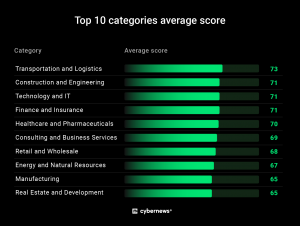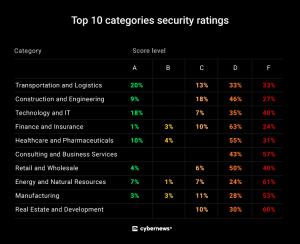
84% of Fortune 500 companies scored a D or worse for their cybersecurity efforts
Cybernews Business Digital Index shows that 84% of analyzed Fortune 500 companies scored a D or worse for their cybersecurity efforts.
VILNIUS, LITHUANIA, December 16, 2024 /EINPresswire.com/ -- The increasing sophistication of cyberattacks, coupled with the expanding attack surface due to cloud adoption, remote work, and complex supply chains, has made robust cybersecurity risk assessment more critical than ever.Unfortunately, with the threat of cyberattacks growing, most organizations may not have raised their security standards accordingly. Cybernews Business Digital Index shows that 84% of analyzed Fortune 500 companies scored a D or worse for their cybersecurity efforts.
The Cybernews research team analyzed 466 companies on the Fortune 500 list. Thirty-four companies could not be analyzed to evaluate an organization's cybersecurity posture. The report evaluates risk across seven key areas: software patching, web application security, email security, system reputation, SSL Configuration, system hosting, and data breach history.
Below is detailed data collected from multiple sources, including IOT search engines, IP and Domain name reputation databases, and custom scanners, that show Fortune 500 companies' digital security posture.
Finance and insurance companies are the most vulnerable
According to the index, which grades businesses based on their online security measures, 84% of Fortune 500 companies scored D or worse, with 43% falling into the F category. Only 6% of analyzed organizations earned an A rating for security measures.
The biggest Fortune 500 category is Finance and Insurance, with 102 companies on the list. 63% of the scored companies received a D rating, and almost 24% received an F rating. Overall, this sector received an average security score of 71.
The second-biggest category, with 88 companies, is Manufacturing. This category's average security score is 65. According to The Business Digital Index, 81% of companies analyzed received a security rating of D or worse, with 53% falling into the F category. Only 3% of companies earned an A rating for their security measures.
61% of analyzed Energy and Natural Resources category companies worldwide scored F, and 24% got a barely passing grade of D. Only 7% of these organizations were worthy of an A rating for their security measures.
A very similar situation exists with companies in the Technology and IT category. Research shows that 75% of analyzed companies scored a D or worse for their cybersecurity efforts.
The healthcare industry is also particularly vulnerable, with 55% of the scored companies receiving a D rating and 31% an F rating. Only 10% of the companies analyzed in the Healthcare and Pharmaceuticals category achieved an A grade. Overall, the healthcare sector received an average security score of 70.
Also, 50% of the scored Retail and Wholesale category companies received a D rating and 40% an F rating. In contrast, Construction and Engineering category companies fared better, with 73% earning a D and F grade for their security.
33% of Transportation and Logistics category companies received D and F scores equally. Most (43%) of Consulting and Business services category companies were rated D, and 57% got an F. Meanwhile, Real estate and Development category companies received 30% for D and 60% for F ratings.
Among all industries, Transportation and logistics category companies have the highest share of A-level companies (20%). Finance and Insurance category companies are the most vulnerable. Only 1% of them gained an A-level security score.
Researchers found nearly 671 critical or high-risk vulnerabilities
The Business Digital Index shows that the most common security issue is related to Secure Sockets Layer (SSL) configurations, with over 490 issues found in 466 analyzed companies.
Furthermore, researchers found nearly 671 critical or high-risk vulnerabilities that hackers can exploit to enter networks and steal information.
Researchers also found that analyzed Fortune 500 list companies have 254 email security issues and 480 total data breach incidents.
Research methodology
You can review the report’s Methodology here. It provides detailed information on how researchers conducted this analysis.
Ruta Pauliukonyte
Cybernews
ruta.pauliukonyte@cybernews.com
Visit us on social media:
Facebook
X
LinkedIn
YouTube
Distribution channels: Banking, Finance & Investment Industry, Building & Construction Industry, Business & Economy, Healthcare & Pharmaceuticals Industry, Real Estate & Property Management
Legal Disclaimer:
EIN Presswire provides this news content "as is" without warranty of any kind. We do not accept any responsibility or liability for the accuracy, content, images, videos, licenses, completeness, legality, or reliability of the information contained in this article. If you have any complaints or copyright issues related to this article, kindly contact the author above.
Submit your press release


